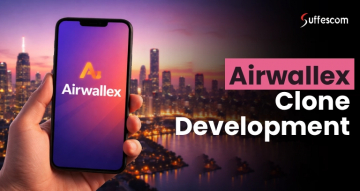Crypto Wallet Development Cost in 2026: Real Breakdown & Smart Budgeting Tips

Building a crypto wallet in 2026? The question everyone asks first is simple: "How much will this cost me?"
Crypto wallet development costs range from $10,000 for a basic mobile wallet to $150,000+ for enterprise-grade solutions. But that's just the starting point.
A cryptocurrency wallet is more than software, it's a secure gateway that enables users to store, send, receive, and manage digital assets. Whether you're building a DeFi wallet, Web3-enabled solution, or multi-chain platform, understanding the true cost drivers is essential.
In this guide, we'll break down real pricing, cost factors, wallet types, and proven strategies to optimize your development budget without compromising security or functionality.
Why Crypto Wallet Development Matters in 2026: Market Growth & Demand
Cryptocurrencies are no longer a niche interest. With blockchain-based platforms, NFT marketplaces, Web3 gaming, and decentralized finance (DeFi) expanding rapidly, digital wallets have become the essential infrastructure for anyone interacting with crypto assets.
A crypto wallet is basically your digital vault. It lets users send, receive, and store cryptocurrencies securely while maintaining full control over their funds. Without a reliable wallet, trading, holding, or even accessing crypto becomes nearly impossible.
Global Crypto Wallet Market: 2026 Outlook
According to Grand View Research, the global crypto wallet market was valued at $12.59 billion in 2024 and is projected to reach $100.7 billion by 2033, growing at a CAGR of 26.3% from 2025 to 2033. Here is a short overview of country-wise adoption rates:
| Country | % Adoption Report | Key Drivers |
| Indonesia | 41% | Mobile-first population, remittances |
| Brazil | 41% | Economic volatility, investment diversification |
| UAE | 35% | Crypto-friendly regulations, fintech hub |
| Singapore | 30% | Financial innovation center |
| Israel | 28% | Tech-savvy population, startup ecosystem |
| US | 20% | Institutional adoption, ETF approvals |
| India | 20% | Young demographic, digital payment culture |
| UK | 18% | Fintech infrastructure |
| Australia | 18% | Progressive crypto regulations |
| Germany | 17% | Investment diversification |
These numbers show how fast global crypto usage is growing. More users mean more demand for user-friendly, secure, and scalable wallet solutions from multi-currency wallets to DeFi wallet apps with advanced features.
Average Crypto Wallet Development Cost
The average cost to develop a crypto wallet typically ranges from $10,000 to $20,000 for basic apps. But that's just the starting point.
For example, a simple app with basic features will cost less than an app with complex features and various integrations. Choosing the type of wallet according to requirements and features will impact the cost.
If you want a multi-chain wallet, DeFi wallet, or a Web3-integrated solution, the cost can easily climb up to $50,000-$100,000, depending on features, tech stack, and customization level.
Quick Cost Overview by Wallet Type
| Wallet Type | Cost Range | Timeline | Best For |
| Basic Mobile Wallet | $10,000 - $20,000 | 2-3 months | Startups, MVP testing |
| Web Wallet | $15,000 - $30,000 | 3-4 months | Browser-based access |
| Multi-Currency Wallet | $25,000 - $50,000 | 4-6 months | Diverse crypto portfolios |
| DeFi Wallet | $40,000 - $80,000 | 5-8 months | DeFi protocols & dApps |
| Enterprise Wallet | $80,000 - $150,000+ | 8-12 months | Large-scale operations |
| Hardware Wallet Integration | $50,000 - $100,000 | 6-10 months | Maximum security needs |
So, what exactly drives those numbers up? Let's break down the main factors.
Understanding Crypto Wallet Types: Cost & Development Breakdown by Category
Crypto wallet development costs vary significantly based on wallet architecture, functionality, and target use case. Let's explore each type with realistic pricing and development considerations.
Web Wallet Development
A secured and robust web wallet application designed to buy, sell, store, and exchange cryptos, tokens, and stablecoins without any hassle. This wallet enhances the financial experience specifically using the browser. Web wallets provide multi-currency support and help users trade seamlessly.
Cost Range: $15,000 - $30,000
Development Time: 3-4 months
Web3 Wallet Development
Web3 wallets solutions are supported by secured and interoperable blockchain platforms. It enables digital currency transfer and tokenization without hassle. The wallet is also known as an online wallet that benefits both startups and established enterprises.
Cost Range: $40,000 - $80,000
Development Time: 5-8 months
Mobile Wallet Development
An easy-to-download and install crypto wallet on mobile phones. The platform allows buying/selling crypto with QR code and NFC (Near Field Communication). The mobile wallet can be encrypted with a password and private keys with safety backup.
Cost Range: $10,000 - $25,000
Development Time: 2-4 months
Multi-Currency Wallet Development
As the name defines, multi-currency wallets hold multiple currencies in one place instead of storing them in separate wallets. Track all investments with real-time portfolio updates.
Cost Range: $25,000 - $50,000
Development Time: 4-6 months
White Label Crypto Wallet Development
White label crypto wallet s a pre-built application that can be developed under your brand. It's a less time-consuming and secure platform that costs less compared to other wallet developments.
Cost Range: $8,000 - $20,000
Development Time: 2-3 weeks
Centralized Wallet Development
If you choose to build a centralized crypto wallet where funds are under the control of a third party and can be easily accessed with their permission. The wallet development is faster to build and ensures quick, safer transactions.
Cost Range: $15,000 - $35,000
Development Time: 3-5 months
Tron Wallet Development
A customized blockchain-based Tron wallet securely stores TRX and other valuable assets. The platform continuously enhances its features and performance to deliver an improved user experience.
Cost Range: $20,000 - $40,000
Development Time: 3-5 months
DeFi Wallet Development
DeFi wallet development gives your customers a gateway to a non-custodial wallet that comes with enhanced security, private keys, and complete control of cryptocurrencies. The platform guarantees the protection of crypto assets and coins.
Cost Range: $40,000 - $80,000
Development Time: 5-8 months
Desktop Wallet Development
The blockchain technology-based wallet gives complete control over keys and funds. A desktop wallet is followed by basic security measures such as antivirus, firewall, and anti-malware software. Examples include Bitcoin Core, Armory, MultiBit, and Electrum.
Cost Range: $12,000 - $25,000
Development Time: 3-5 months
Paper Wallets Development
This type of crypto wallet address and its private key are on paper in QR codes. Users can scan the codes to execute cryptocurrency transactions.
Cost Range: $3,000 - $8,000
Development Time: 2-4 weeks
Hardware Wallets Development
The perfect wallet for users who do not wish to buy or sell crypto actively. This type of wallet protects private keys from viruses and hackers' online attacks, as everything is stored in a pen drive or hard drive.
Cost Range: $50,000 - $100,000
Development Time: 6-10 months
Crypto wallet development cost varies because of security and other defined features. Some of them are complex based on functionality, so consult with our experts to know which cryptocurrency wallet development suits your platform.
8 Key Factors Affecting Crypto Wallet Development Cost in 2026
Understanding cost drivers helps you make informed decisions and optimize your budget. Here are the critical factors that determine your final cryptocurrency wallet development price.
1. Blockchain and Cryptocurrencies
A blockchain is a chain of blocks where the blocks contain digital information (data), and the chain is the cryptographic principle used to connect the data blocks.
A cryptocurrency wallet is built on blockchain technology to provide safe sharing of digital assets. Connecting with blockchain technologies such as Ethereum, Solana, Polygon, Polkadot, EOS, and similar will add costs. It can start from $1,500 and increase according to your platform requirements.
Cost Impact: $1,500 - $10,000 per blockchain integration
2. Design of Crypto Wallet
The UI/UX of the cryptocurrency wallet highly impacts the overall cost. Crypto can be complex for beginners, so it is very important that the design is clean and intuitive.
Besides aesthetics, it helps users feel how secure and reliable a wallet is. While quality design may increase initial development costs, it pays off through improved user retention and reduced support needs.
Cost Impact: $5,000 - $15,000
3. API Integration
Using an API is a great way to enrich your platform with advanced features. Also, integrating an API allows you to synchronize your crypto wallet with the blockchain ecosystem easily. Coinbase, Bitcore, SimpleSwap, and Factom are names of a few highly popular APIs.
Using a ready-to-use API can boost your wallet development speed but add cost to your platform development. The cost will depend on your API type.
Cost Impact: $2,000 - $10,000 per API integration
4. Technology Stack
The selection of the right technology stacks can help you build a platform faster and cut costs. Here is the tech stack for developing a cryptocurrency wallet:
Programming Languages Used:
- Java
- C++
- Python
- Rust
- GO
Databases:
- Postgresql
- Mysql
- Cassandra
- BigchainDB
- AWS
- QuantumLedger Database
5. Development Team Size
The cost of a crypto wallet also depends on the size of the team that is going to build your platform. Generally, a standard team for cryptocurrency wallet app development will include:
- 1 Project Manager
- 2 Backend Developers
- 2 iOS/Android Developers
- 1 Designer
- 1-2 Quality Analysts
6. Security
Security is paramount when you build a cryptocurrency wallet app. Therefore, you should ensure that your cryptocurrency app has top-notch security, which will impact the overall cost. You can also look for an additional layer of security with 2FA—fingerprint, face ID, and hardware authentication.
- Multi-Layer Authentication
- Real-Time Threat Monitoring
- Private Key Protection
- Secure API & Blockchain Interactions
- Regular Updates & Patch Management
- End-to-End Encryption
- Cold Storage Integration
- Penetration Testing
7. Integrated Features
The features incorporated in a crypto wallet also impact the overall cost. A simple crypto wallet with basic features like buy or sell will cost less, whereas a crypto wallet integrated with features like MFA and multi-crypto support will cost more.
8. Third-Party Integrations
Integrating with exchanges, payment processors, and other services increases functionality but adds costs.
Common Integrations:
- Exchange APIs (Binance, Coinbase)
- Payment gateways
- Price feed services
- Analytics tools
- Customer support systems
Cost Impact: $3,000 - $15,000
Ready to Build Your Secure Crypto Wallet?
Work alongside experienced developers to build a reliable, customizable, and user-friendly crypto wallet tailored for you.
How Features Impact The Cost Of Crypto Wallet Development
The following are some crypto wallet solution features. Adding or removing them has a direct impact on crypto wallet development costs.
Multi-Factor Authentication
Multi-Factor Authentication features enhance the security of your wallet. The wallet consists of public and private keys that promote end-to-end encrypted transactions.
Multi-Crypto Support
As the name defines, the platform supports multiple currencies like Bitcoin, Ethereum, Litecoin, and other Altcoins. It helps boost customer reach but adds cost at the time of development.
Transaction History
Stores the number of peer-to-peer transactions performed by users on the platform. The transactions can be checked using a single currency or multiple currencies using the filter option.
Real-Time Conversion Rates Updates
To understand the automatic exchange rates of the solution, the platform provides automatic exchange rate information. Users can check charts and graphs to make informed decisions.
Wallet Backup
To protect wallets from unseen situations like attacks and hacks, wallet backup features are integrated. Depending on the storage requirement, the cost of the backup feature is charged by experts.
Automated Session Logout
The wallet session logs out automatically after a specific period of inactivity. It also helps prevent fraudulent activities on the wallets. Others need a password to access wallet content.
QR Code Scanner
Enables all payments through a single click via a QR code scanner. Users can send or receive cryptocurrency with their wallets.
Push Notifications
This feature will help notify the user about the price of crypto, transaction status, and security alerts. Users can update information in real-time through this feature.
Biometric Authentication
Fingerprint, Face ID, and iris scanning for enhanced security and user convenience.
By now, you understand how various features and integrations impact development expenses. Let’s simplify things further with a detailed cost breakdown for different components of a crypto wallet app.
Cost-Breakdown of a Crypto Wallet App
Understanding all the features, functionalities, tech stacks, and more of the crypto wallet solution development, we crafted a chart defining the cost of cryptocurrency wallet development. Let's check out the estimated figures that you may expect for your secured crypto wallet solution development.
| Process | Estimated Cost |
| Backend Development | $12,000 – $16,000 |
| Android | $25,000- $30,000 |
| iOS | $21,000- $28,000 |
| Web/Desktop | $12,000- $11,000 |
| Design | $9,000- $12,000 |
| QA/PM | $5,000- $8,000 |
| Total | $84,000- $105,000 |
Cost-Saving Strategies for Crypto Wallet Development
1. Start with MVP (Minimum Viable Product)
Launch with core features and add advanced functionality based on user feedback.
Potential Savings: 40-60% on initial development
2. Use White Label Solutions
Pre-built solutions can be customized with your branding at a fraction of the cost.
Potential Savings: 50-70% compared to custom development
3. Choose Cross-Platform Development
Build once for multiple platforms using React Native or Flutter.
Potential Savings: 30-40% compared to native development
4. Leverage Open-Source Libraries
Use established libraries like BitcoinJ, Web3.js, or Ethers.js.
Potential Savings: $5,000 - $15,000
5. Outsource to Experienced Teams
Partner with specialized blockchain development companies for cost-effective solutions.
Potential Savings: 30-50% compared to in-house development
6. Prioritize Essential Features
Start with must-have features and add nice-to-have features in later versions.
Potential Savings: 25-40% on initial budget
Why Choose Us for Cost-effective Crypto Wallet Development Solutions
We navigate your crypto wallet development journey while ensuring meaningful outcomes that help your business achieve tangible results. Some reasons to choose our platform are:
Affordable Development Plans
Our services are created to fit different budgets and needs for startups, SMEs, and large enterprises, all with top quality.
Rigorous Testing & Audits
All solutions are audited and performance-tested extensively for their dependable use.
Accelerated Transactions
Optimized blockchain integrations ensure fast and seamless crypto transactions.
Scalable Infrastructure
Built to handle increasing user loads, future updates, and multi-chain capabilities.
Cross-Platform Compatibility
Seamless performance across iOS, Android, Web, and Desktop environments.
User-Friendly Interface
Designed for both new and experienced users to interact with ease and confidence.
Exchange & DeFi Integration
Smooth connection with major crypto exchanges and DeFi protocols for enhanced utility.
Standalone Capability
Fully functional as an independent crypto wallet app, without relying on third-party tools.
24/7 Support
Round-the-clock technical assistance for any issues or customizations.
Rapid Deployment
Fast-track development to get your wallet to market in the shortest time possible.
13+ Years of Experience
Over a decade of blockchain development expertise with 500+ successfully delivered projects.
Transparent Pricing
No hidden costs, clear pricing models with detailed breakdowns upfront.
To know more about us, schedule a call with our expert. We provide you with a complete guide to assist you!!
FAQs
1. What is the average cost to develop a cryptocurrency wallet?
Developing a cryptocurrency wallet typically costs between $10,000 to $50,000+ depending on its type, number of features, and security needs. A basic mobile wallet might cost $10,000-$20,000, while a feature-rich DeFi wallet with multi-chain support can cost $40,000-$80,000.
2. How long does it take to develop a crypto wallet?
A simple mobile or web wallet may take 2-4 months, while a multi-currency or DeFi wallet with advanced features like real-time conversion rates, staking, or DApp browser could take 5-8 months. Enterprise-grade wallets with extensive compliance and security features may require 8-12 months. A reliable blockchain development company can provide a detailed timeline based on your project requirements.
3. What are the key security features needed for a crypto wallet?
Essential security features include multi-factor authentication (e.g., fingerprint, face ID), end-to-end encryption, private key management, wallet backup, and automated session logout.
4. Should I choose a custodial or non-custodial crypto wallet for my platform?
Custodial wallets are easier to develop and manage, as a third party controls the funds, but they may reduce user trust and autonomy. Non-custodial wallets give users full control over their private keys, appealing to privacy-focused users but requiring advanced security measures, which can increase development costs by 30-40%. The choice depends on your target audience, regulatory requirements, and business model.
5. Can I reduce crypto wallet development costs without compromising quality?
Yes, you can lower costs by using open-source libraries like BitcoinJ or Coinbase SDK, opting for a white-label solution, or starting with a minimum viable product (MVP) with core features like multi-currency support and basic security. Prioritizing essential features and scaling later can also help manage expenses.
6. Which industries use Cryptocurrency wallet development solutions?
Cryptocurrency wallet development solutions are utilized in many industries, including:
- Food
- Education & E-learning
- Logistics
- Real-Estate
- Entertainment & Media
- Gaming
- Blockchain BFSI & Finance
- Healthcare
- Retail
- ECommerce
- Travel & Tourism
7. What's the difference between hot wallets and cold wallets?
Hot wallets are connected to the internet, offering convenience for frequent transactions but with higher security risks. They're ideal for daily trading and transactions. Cold wallets are offline storage solutions (hardware or paper wallets) offering maximum security for long-term storage but less convenient for frequent use. Many users employ a combination of both for optimal security and convenience.
8. Do crypto wallets support all cryptocurrencies?
Not all wallets support every cryptocurrency. Basic wallets typically support major cryptocurrencies like Bitcoin, Ethereum, and popular altcoins. Multi-currency wallets can support 50-500+ cryptocurrencies.
9. Can I integrate my crypto wallet with existing financial systems?
Yes, crypto wallets can be integrated with:
- Banking APIs for fiat on/off ramps
- Payment processors (Stripe, PayPal)
- Accounting software (QuickBooks, Xero)
- Tax reporting tools
- Exchange platforms







